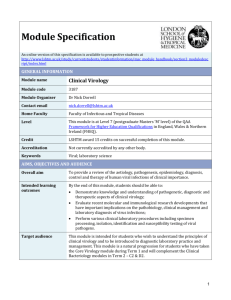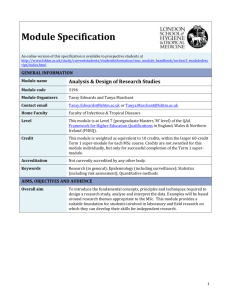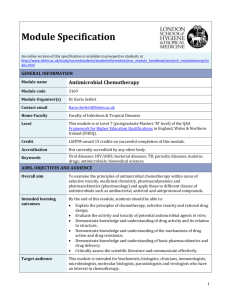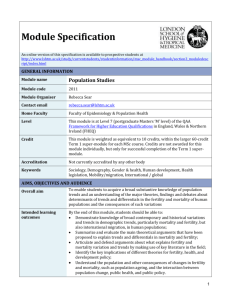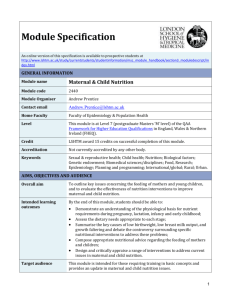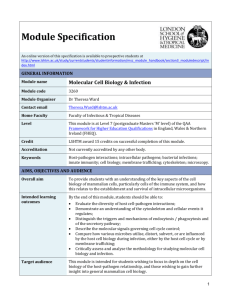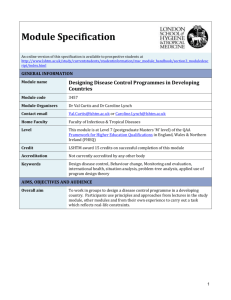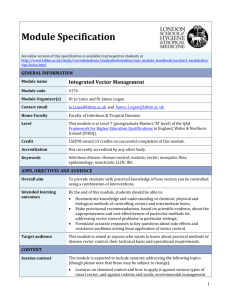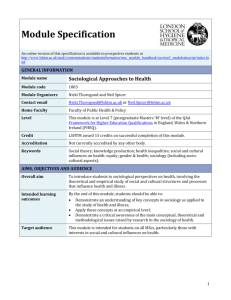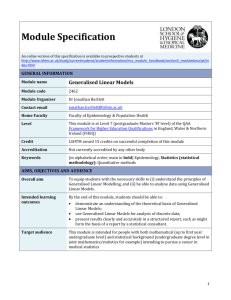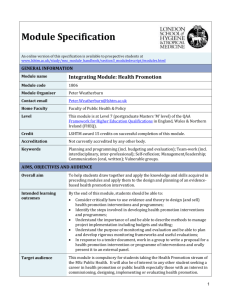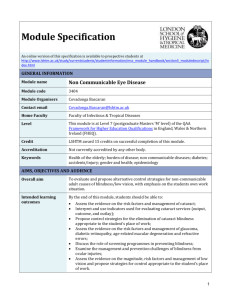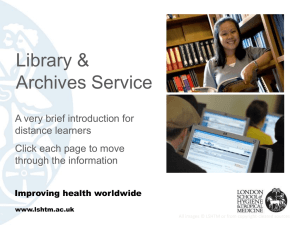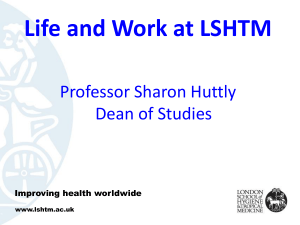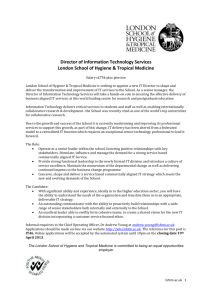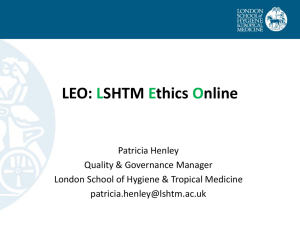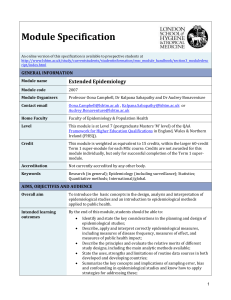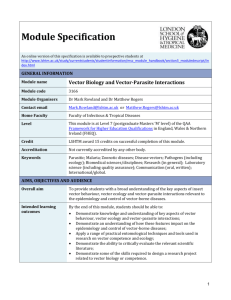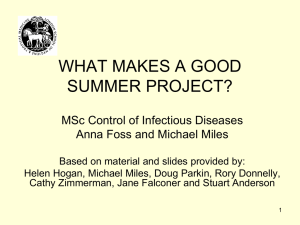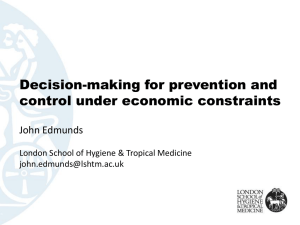3121 Bacteriology & Virology Module Specification
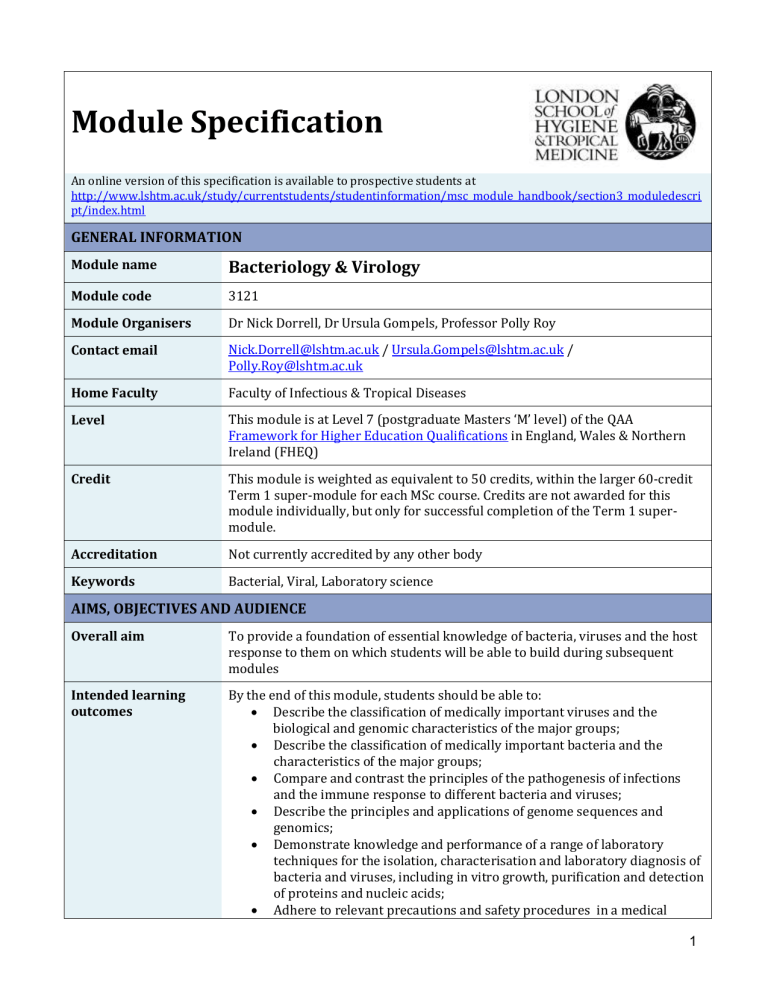
Module Specification
An online version of this specification is available to prospective students at http://www.lshtm.ac.uk/study/currentstudents/studentinformation/msc_module_handbook/section3_moduledescri pt/index.html
GENERAL INFORMATION
Module name
Module code
Module Organisers
Contact email
Home Faculty
Level
Bacteriology & Virology
3121
Dr Nick Dorrell, Dr Ursula Gompels, Professor Polly Roy
Nick.Dorrell@lshtm.ac.uk
/ Ursula.Gompels@lshtm.ac.uk
/
Polly.Roy@lshtm.ac.uk
Faculty of Infectious & Tropical Diseases
This module is at Level 7 (postgraduate Masters ‘M’ level) of the QAA
Framework for Higher Education Qualifications in England, Wales & Northern
Ireland (FHEQ)
Credit
Accreditation
Keywords
This module is weighted as equivalent to 50 credits, within the larger 60-credit
Term 1 super-module for each MSc course. Credits are not awarded for this module individually, but only for successful completion of the Term 1 supermodule.
Not currently accredited by any other body
Bacterial, Viral, Laboratory science
AIMS, OBJECTIVES AND AUDIENCE
Overall aim
Intended learning outcomes
To provide a foundation of essential knowledge of bacteria, viruses and the host response to them on which students will be able to build during subsequent modules
By the end of this module, students should be able to:
Describe the classification of medically important viruses and the biological and genomic characteristics of the major groups;
Describe the classification of medically important bacteria and the characteristics of the major groups;
Compare and contrast the principles of the pathogenesis of infections and the immune response to different bacteria and viruses;
Describe the principles and applications of genome sequences and genomics;
Demonstrate knowledge and performance of a range of laboratory techniques for the isolation, characterisation and laboratory diagnosis of bacteria and viruses, including in vitro growth, purification and detection of proteins and nucleic acids;
Adhere to relevant precautions and safety procedures in a medical
1
Target audience microbiology laboratory;
Undertake subsequent modules in related disciplines.
Bacteriology & Virology is intended for students, molecular biologists, biochemists and clinically trained graduates intending to acquire knowledge in the field of general medical and molecular bacteriology and virology. For most students, the theoretical part of the module should update and extend their knowledge from their first degree and practicals will provide working knowledge of the "tools of the trade".
CONTENT
Session content The module is expected to include sessions addressing the following topics
(though please note that these may be subject to change):
Bacteriology
Bacterial structure
Bacterial function
Bacterial metabolism
Genetics and genomics
Classification of bacteria
Identification strategies
Diagnostic approaches
Mechanisms of pathogenesis
Immune response to bacteria
Antibiotics
Virology
Classification of viruses
Structure/function of viral nucleic acids
Viral proteins and virus genetics
Virus-host cell interactions
Immune response to viruses
Virus transmission
Viral pathogenesis
Anti-viral therapy
Laboratory diagnosis of human viral infections
TEACHING, LEARNING AND ASSESSMENT
Study resources provided or required
Teaching and learning methods
All materials and equipment for the practical sessions will be provided. Detailed handouts for lectures will also be provided as a hard copy.
Teaching will consist of formal lectures, group learning/review sessions and tutorials, which will be complimented by hands-on practical exercises in the laboratory. Time for private study will be allocated in the timetable, but students will be expected to read around the subjects outside working hours.
2
Assessment details
Assessment dates
During Term 1, there will be assessment comprising four components: assessment of practical skills and multiple choice question (MCQ) tests that will be conducted at the end of each five week session for both bacteriology and virology.
The grades for each component will be weighted 40% for the two practical assessments and 10% for the two MCQ tests respectively and combined to give an overall GPA. The module will also be assessed in Paper 1 during the written examinations in June.
Practical and MCQ assessments will take place during Week 5 and Week 10.
For students who are required to re-sit, or granted a deferral or new attempt at either of the practical assessments, the next assessment dates will be in the
Easter holidays of the same academic year.
For students who are required to re-sit, or granted a deferral or new attempt at the Paper 1 written examination, the next examination date will normally be the following June.
Language of study and assessment
TIMING AND MODE OF STUDY
Duration The module runs for 10 weeks at 4 days per week; this module runs from
Monday to Thursday.
Dates
English (please see ‘English language requirements’ below regarding the standard required for entry).
Timetable slot
Mode of Study
For 2015-16, the module will start on Monday 5 October 2015 and finish on
Thursday 17 December 2015.
The module runs in LSHTM timetable slot Term 1
The module is taught face-to-face in London. Both full-time and part-time students follow the same schedule.
Learning time The notional learning time for the module totals 500 hours, consisting of:
Contact time ≈ 240 hours
Directed self-study ≈ 160 hours
Self-directed learning ≈ 30 hours
Assessment, review and revision ≈ 70 hours
APPLICATION, ADMISSION AND FEES
Pre-requisites
English language requirements
Awarded a place on either the Medical Microbiology MSc course or the Molecular
Biology of Infectious Diseases MSc course.
A strong command of the English language is necessary to benefit from studying the module. Applicants whose first language is not English or whose prior university studies have not been conducted wholly in English must fulfil
LSHTM’s English language requirements , with an acceptable score in an approved test taken in the two years prior to entry. Applicants may be asked to take a test even if the standard conditions have been met.
Student numbers Student numbers are typically 25 - 30 per year; numbers will be capped at 30 students due to available spaces in the LSHTM Microbiology teaching laboratory.
3
Student selection
Fees
Scholarships
Preference will be given to LSHTM MSc Medical Microbiology students then MSc
Molecular Biology of Infectious Diseases students will usually be offered a place in the order applications are received, until the cap on numbers is reached.
Partial Registration (partial participation for lectures only) by LSHTM research degree students is allowed for this module.
For registered LSHTM MSc students, fees for the module are included within MSc fees (given on individual course prospectus pages ).
If registering specifically for this module, as a stand-alone short course , individual module fees will apply.
Tuition fees must be paid in full before commencing the module, or by any fee deadline set by the Registry.
Scholarships are not available for individual modules. Some potential sources of funding are detailed on the LSHTM website.
Admission deadlines For 2015-16:
For registered LSHTM MSc students, the module choice deadline is the end of
Term 1 Orientation Week, Friday 2 October 2015.
If registering specifically for this module, applications may be made at any time. The School gives priority to the needs of students registering for
Masters and Research Degrees, and so places on any module may be limited - early application is therefore advised. Formal registration will take place on the morning of the first day of the module.
ABOUT THIS DOCUMENT
This module specification applies for the academic year 2015-16
Last revised 17 th July by Dr Nick Dorrell
London School of Hygiene & Tropical Medicine, Keppel St., London WC1E 7HT. www.lshtm.ac.uk
4
